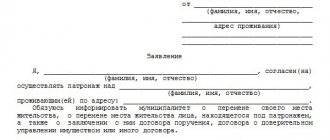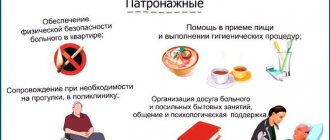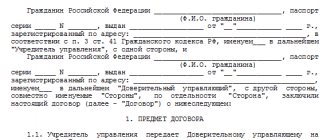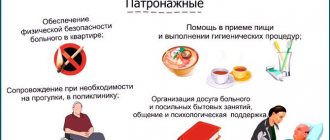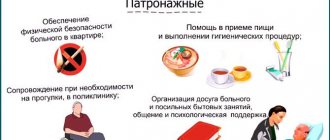The development of modern medicine has led to a significant increase in human life expectancy. If at the beginning of the last century people, on average, lived no more than 50-60 years, today, and especially in developed countries, they can live much longer.
However, in old age, a person is faced with many diseases and conditions that significantly reduce the quality of life. Moreover, some of them have such a negative impact on health and the ability to socialize and live in society that a citizen is simply not able to fully serve himself, fully enjoy his rights and fulfill the corresponding responsibilities.
In this case, the law provides for the possibility of obtaining guardianship over an elderly person. What it is, what rights and responsibilities it entails and how it is formalized will be discussed further in the article.
What does guardianship of an elderly person mean?
In 2021, guardianship is understood as a form of support for an adult incapacitated citizen. The fact of incapacity must be confirmed by a court decision.
Expert opinion
Stanislav Evseev
Lawyer. Experience 12 years. Specialization: civil, family, inheritance law.
The World Health Organization defines elderly people as those aged between 60 and 74 years. The law does not provide for the need to deprive citizens of legal capacity based on age. Therefore, an elderly person has full legal capacity.
The exception is the situation when a citizen is deprived of legal capacity due to a mental disorder. It doesn't depend on age. However, for older citizens, the most popular cause is senile dementia.
Guardianship over an elderly incapacitated person is appointed by a resolution of the district administration. In the absence of relatives or third parties, the powers of the guardian are transferred to the head of the specialized organization.
If the citizen has not been deprived of legal capacity, then the appointment of guardianship is impossible. However, to help a capable person who needs constant outside support, patronage is assigned.
Patronage refers to physical assistance (cleaning, cooking, shopping). The guardian not only provides physical assistance, but also represents the property interests of the ward without a power of attorney.
Legal regulation of the issue
Consideration of the procedure for guardianship of elderly citizens should begin with a study of the legislation. The main regulatory legal act consecrating these relations is the Civil Code of the Russian Federation.
In accordance with the provisions of civil legislation, partially capable, incompetent elderly people can obtain protection of their interests by establishing guardianship over them ( Article 31 of the Civil Code of the Russian Federation ).
In addition, a person caring for an elderly person has the right to defend the interests of the latter in courts and government agencies. The guardian is subject to obligations that must be fulfilled. Otherwise, the guardian is deprived of the opportunity to care for the pensioner and the payments provided in this case. The incapacity of elderly citizens is established through a court hearing.
A balanced decision is made in accordance with the grounds specified in Art. 29, 30 Civil Code of the Russian Federation . Most often, loss of capacity is associated with mental illness.
The main document regulating the relationship between guardians and their wards, as well as the procedure for establishing and terminating guardianship, is the Law “On Guardianship and Trusteeship”.
Normative base
The procedure for registration, implementation or termination of guardianship is contained in the following regulations:
- Family Code of the Russian Federation;
- Civil Code of the Russian Federation;
- Law of 2008 No. 48;
- Government Decree No. 927 of 2010.
Guardianship must be appointed within 30 days from the date of entry into force of the court decision on deprivation of legal capacity. If there is no candidate for guardianship, the powers of the guardian are transferred to the guardianship department.
Important! If a guardian is appointed for an incapacitated ward, interested persons have the right to challenge the candidacy of a representative in court.
Law
State support for citizens who are on pensions is regulated by regulatory documents at the federal level.
Old age guardianship is regulated by the following number of legislative acts:
- Civil Code of the Russian Federation of November 14, 2002 No. 138-FZ - data on guardianship of the elderly must be sought in articles 11, 29, 32, 35, 40, 41 and 48;
- Federal Law of August 22, 2008, which concerns social services for the elderly and persons with disabilities;
- document dated December 22, 2014 No. 48-FZ.
Guardianship of an elderly person after 80 years of age is a procedure that does not apply to all citizens who have reached old age.
Requirements for a guardian
Let's consider who can be a representative.
The law allows you to transfer the care of an adult incapacitated citizen to a third party who meets the established requirements ( Article 35 of the Civil Code of the Russian Federation ):
- no criminal record;
- availability of income;
- availability of living space;
- no medical contraindications;
- full capacity.
A citizen who is subject to a court decision on deprivation of parental rights cannot be appointed as a guardian. If parental rights are restored, the restriction is lifted.
In addition, the candidate cannot previously be removed from the duties of a guardian for improper performance of duties.
A prerequisite is the consent of the citizen to receive the duties of a guardian. The law does not allow the appointment of guardianship against the will of the guardian.
Particular attention is paid to the moral qualities of the candidate. Also, a guardian cannot be a person registered at a drug treatment clinic as a patient with alcoholism or drug addiction.
Important! The law does not set an age limit for a guardian.
Is property inherited?
A reasonable question that arises for guardians is the right to inherit real estate during foster care. The guardian does not automatically receive inheritance rights. However, in the absence of direct family ties, implying the transfer of property after the death of an elderly person, it is necessary to draw up a will for the ward, who voluntarily wishes to bequeath his property to the guardian.
Relationships are monitored by guardianship authorities to assess the degree of care, the absence of oppression of the rights of an elderly person, in order to avoid psychological pressure. If supervisory employees identify violations, the authority stops these relations and terminates the contract according to the law. The parties themselves also have the right to unilaterally refuse previously concluded agreements.
Terms of custody
Let's look at the cases in which guardianship is granted to the legally incompetent. To appoint guardianship over an adult citizen, it is necessary to declare him incompetent in court. In this case, the guardian fully represents the interests of the ward.
One of the important points is the representation of the property interests of the incapacitated person. Every year, before February 1, the guardian submits a report on the expenditure of the ward’s funds to the guardianship department.
If the elderly parents were not deprived of legal capacity, but limited, then guardianship is established. In such a situation, the trustee has only part of the rights. The citizen independently makes transactions with the consent of the trustee.
Guardianship of an incompetent person is carried out on a paid or gratuitous basis. When a paid form of placement is assigned, a guardianship agreement is concluded between the guardian and the district administration.
Payment for the services of a guardian is made from the property of the ward. The limit cannot exceed 5% of the monthly income of the disabled person.
The ward is not required to live with a guardian. Even if a citizen needs constant outside care, a representative can visit him daily, hire a nurse or provide assistance in another form.
If a citizen is placed in a specialized organization, then guardianship is terminated.
What duties must be performed to care for a pensioner?
A person who wishes to care for an elderly pensioner must clearly understand what his responsibilities will be. These include:
- providing assistance to the ward in everyday matters and physical care;
- purchasing food, clothing, hygiene items and everything necessary;
- payment of utilities, taxes and bills from the funds of the ward, performing necessary monetary transactions in his interests;
- in all life situations it is necessary to protect the rights of the person under guardianship and protect his interests.
As for financial transactions, the guardian is required to submit a written report to the guardianship authorities annually.
Registration procedure
The procedure for obtaining guardianship over a mother takes a long time:
- Obtaining an ITU opinion . You must first pass a medical examination and sign up for a commission at the district office. By decision of the commission, a conclusion is issued about the presence of a mental illness, and a disability is assigned. Based on documents that a citizen cannot understand the consequences of his actions, he will need to go to court. The process can take from 3 to 6 months.
- Going to court . The legal process can be initiated by the guardianship department or relatives. During the process, you must present medical documentation and an ITU report. After the court decision enters into legal force, guardianship may be appointed over the incompetent person. The procedure takes from 2 to 3 months.
- Registration of guardianship . The applicant applies to the guardianship department at the place of residence of the incapacitated person. He submits an application and personal documents. After which, he is appointed as the representative of the elderly person. The process takes no more than 30 days.
The law provides for the possibility of appointing one or more guardians. If a citizen needs two or more representatives, guardians must stipulate the list of powers of each of them and approve them in the guardianship department. For example, one deals with property issues, the second with cleaning, and the third with care.
Algorithm of actions
The procedure for registering guardianship over elderly people is established by Government Resolution No. 927 of 2010.
Algorithm of actions:
- Collection of documents.
- Obtaining a conclusion.
- Contact the guardianship department.
- Submitting an application.
- Appointment of guardianship.
Contacting the guardianship department
Let's consider where to obtain guardianship for the elderly. The citizen must contact the guardianship department at the place of registration of the incapacitated citizen.
Responsibility for an adult incompetent person is assigned by the court to the guardianship department at the place where the court decision was made.
You must first confirm your appointment time with a specialist. An employee of the guardianship department will conduct a consultation, provide a list of documents and order information that should be received as part of interdepartmental interaction.
Application for guardianship
You can apply for guardianship of your grandmother:
- directly to the guardianship department;
- using an electronic document (through State Services);
- through the MFC (if an agreement has been concluded between the district administration and the center.
The citizen independently chooses where to apply. However, the easiest option is to contact the guardianship department in person. A specialist will immediately check all documents and give advice on correcting violations.
Let's look at how to fill out the application correctly:
- name of the district administration;
- FULL NAME. head of administration;
- applicant's details (full name, address, passport details);
- document's name;
- information about the potential ward;
- details of the document on recognition of incapacity;
- information about the presence/absence of family ties;
- data on cohabitation;
- request for guardianship;
- date and signature.
Sample application for guardianship of a senior citizen
Resolution on appointment of guardianship
Let's consider what gives a guardian the right to represent the interests of a pensioner. The main document confirming authority is the decision on the appointment of guardianship.
A resolution on the appointment of guardianship is an act of a local government body. It is drawn up in writing and contains the personal signature of the head of the local administration or his deputy. The form has an issue date and serial number. Information about all decisions is entered into a special journal.
The document does not contain an expiration date. The law establishes the following reasons for termination of the resolution:
- death of a guardian or ward;
- restoration of legal capacity in court;
- refusal of the guardian to responsibilities;
- removal of a representative by decision of the guardianship department.
Legislative aspects
Before becoming a patron, you should familiarize yourself with the legislative acts regulating this issue. The main documents on the basis of which the appointment procedure takes place are:
- Family and Civil Codes of the Russian Federation;
- Federal Law No. 48, it contains information on the procedure for appointing a trustee.
Registration of guardianship over an elderly citizen is a rather serious step, entailing:
- looking after the ward;
- providing assistance with housework;
- and representation of the interests of the ward.
Due to such serious tasks falling on the shoulders of the assistant, the procedure for appointing a patron occurs only in accordance with the requirements of the law.
Attention: if a patron is appointed by the state, but for some reason he does not want this, then re-appointment is no longer possible.
Rights and obligations
A citizen appointed as an assistant to a senior citizen has a number of certain rights and responsibilities, the list of which is indicated in the agreement drawn up between the parties, these include:
- the ability to dispose of the property of a person under the protection, but only if he allows it;
- the right to receive remuneration, both for the guardianship itself and for any individual services, but all this must be specified in the contract;
- the possibility of living in a residential area owned by the ward or transferring it to their own territory for joint living, which is also discussed by both parties;
- work activity on the part of the trustee is allowed, but in cases with persons over 80 years of age, most likely there simply will not be time for it;
- the right to demand compensation for additional expenses incurred if they were spent on the ward;
- the rights also include the ability to manage finances belonging to the ward; this can be done without additional permission from the guardianship department, but expenses must be directed strictly at the senior citizen;
- if the trustee does not have any income, that is, there is no salary or payments from the state, he has the right to receive 1,200 rubles as state support.
Having found out what rights the patron has, one should not forget about the obligations of the party acting in this role. These include:
- execution of various kinds of assignments up to representation in court;
- care and desire to improve the physical and moral condition of the ward;
- is also obliged to notify the guardianship departments about a change of place of residence or a change in the existing personal documentation of the ward;
- if funds related to the personal budget of a senior citizen are spent, then it is necessary to provide a report on where and on what they were spent;
- if an assistant has spent personal funds on the needs of an elderly ward and wants to return them, then facts confirming the expenses must be provided.
As for older people, their basic rights are:
- the ability to choose a person who will act as an assistant;
- the right to break all agreed upon obligations at will.
This applies to those elderly people who are capable, since if the court recognizes a person as incompetent, it independently appoints patrons.
Requirements
The law imposes a number of requirements on a citizen who wants to become an assistant to an elderly person, which include:
- reaching the age of majority;
- the person must have full legal capacity;
- absence of diseases that are serious and dangerous to others;
- the future assistant must have no criminal record;
- he must own residential real estate.
Any citizen can be appointed as a patron, that is, the presence of family ties with the citizen in need of help is not necessary. Citizens may have several elderly people under their guardianship; the law allows for simultaneous care for several people.
Responsibility
The assistant is the person who bears full responsibility for the health and life of the elderly citizen under his care.
Also, the law of the Russian Federation obliges persons acting as assistants to provide reporting information in the established form for the past year, no later than the first of February of the following year. Violation of the period established for reporting or detection of any violations by the guardianship authorities will entail criminal or administrative liability.
Documents required to establish guardianship
Let's look at how to become a guardian for the elderly. To do this, you need to prepare a package of documents.
The list differs for the following categories of applicants:
- Strangers.
- Relatives who have lived with the potential ward for more than 10 years.
List of documentation for candidates for guardianship of a disabled adult
| List of documents | Strangers | Relatives who have lived with the ward for at least 10 years |
| Passport | + | + |
| Document on completion of training | + | — |
| Medical report | + | + |
| Marriage document (if available) | + | + |
| Autobiography | + | — |
| Consent of all family members | + | — |
| Income information | + | — |
| Statement | + | + |
Less stringent requirements apply to citizens who have lived with a disabled adult for more than 10 years. Moreover, it does not matter who is the owner of the residential premises (guardian or ward). However, the applicant must prove the relationship. You must provide documentation confirming your relationship.
A number of documents are requested by guardianship department specialists independently. The list includes:
- information about pensions from the Pension Fund of the Russian Federation;
- criminal record information;
- an extract from the house register;
- information about the sanitary condition of the premises;
- conclusion on the possibility of being a guardian.
The specialist must take the information within 2 days from the date of submission of the application. The response is provided as part of interdepartmental cooperation within 5 days from the date of receipt of the request.
Within 7 days from the date of submission of the application and provision of documents, a specialist from the guardianship department must visit the candidate’s living quarters. He conducts an examination and draws up a report. The document is signed within 2 days and after 3 days is provided to the candidate.
What documents need to be submitted to the concerned authority?
Old people who need the services of an assistant must personally contact the executive body at their place of residence or use the services of an intermediary (you will need to issue a power of attorney).
The applicant must submit an application for the need for social protection. In addition to the application, you need to take with you a medical certificate containing information about the elderly person’s health status.
After the pensioner submits documents, the application must be submitted by the person planning to become an assistant. The package of papers also contains an outline of the agreement that will be signed by the parties. The citizen providing guardianship undergoes a medical examination by a narcologist, a psychologist and at a tuberculosis dispensary.
Certificates issued to the patron must indicate:
- absence of a person’s addiction to drugs, alcohol, mental disorders, tuberculosis;
- integrity of the patron (issued at the place of residence, work, study);
- the ability to care for others (depending on health status);
- the guardian has the right of ownership (use) of the housing (often it is the carer who lives with the ward).
Legal acts of subjects may include other requirements that must be submitted to the institution.
Guardianship of an elderly relative after 80 years of age
A citizen over 80 has the right to care. He can get help from a relative or a third party.
If he is deprived of legal capacity, guardianship is appointed. If a citizen does not have mental disabilities, then patronage is established.
When a person turns 80, he becomes entitled to a supplement, which is paid when an assistant is appointed. The assistant is not paid additional pay, but he receives seniority.
Assistant Requirements:
- age from 14 to 60 (for women) or 65 (for men) years;
- absence of a court decision on deprivation of legal capacity;
- lack of official employment.
Important! A minor aged 14 to 18 years can perform the duties of an assistant only with the permission of the district guardianship department and with the consent of parents or other representatives. But he cannot be a guardian of an incapacitated person, only an assistant.
At the same time, a citizen cannot have official employment (under an employment contract, under a civil law contract, individual entrepreneur, founder of an LLC).
Who can care for the elderly?
Initially, it is necessary to understand that guardianship is a voluntary right. It is not forcibly assigned. Registration can take quite a long time, you need to be careful and patient.
The legislation specifies a number of obligations that will be assigned to the assistant; he must:
- support a senior citizen who is over 80 years of age;
- provide quality care;
- provide timely treatment to the pensioner;
- represent the property and personal rights of the ward;
- make important decisions on behalf of the ward that affect his life.
The law expects that a guardian who intends to care for a senior citizen will meet certain established requirements.
Among them, some parameters stand out; a person must:
- be of legal age;
- be considered fully capable;
- have no previous convictions;
- do not have mental disorders, problems with drug addiction or alcoholism.
In addition, the consent of the elderly person to guardianship by a certain person is also taken into account.
The guardian and the ward may not be blood relatives. But most often, care for the elderly is taken on by people who are related to older citizens.
Guardianship can be obtained by social security employees with whom the person is registered.
It is possible that a pensioner can obtain the status of a guardian, but only if he meets all the established requirements.
Persons who are elderly can count on 2 types of possible guardianship: full and patronage.
Full care for a pensioner is required if a person over 80 has completely or severely lost the ability to manage his own rights and responsibilities. In addition, such citizens may have great problems with self-care.
Full guardianship is established over senior citizens who meet the following requirements:
- the person needs complete and constant care, as confirmed by a medical certificate issued by the relevant institution;
- have a disability of group I.
Patronage is issued to persons who cannot exercise their rights and responsibilities, but are considered absolutely capable.
The assistant has limited powers, which are prescribed in the drawn up agreement.
Elena Smirnova
Pension lawyer, ready to answer your questions.
Ask me a question
According to the law, patronage cannot be established over a person who has a documented mental illness, because in this case, capacity is not considered proven.
How much do caregivers earn?
The law provides for a special payment for guardians in old age. It is transferred by the Pension Fund, in conjunction with the pension of the ward. Compensation in 2021 is 1200 rubles.
It is not assigned to persons who receive 2 pensions. These include security forces, police officers, firefighters, police officers and drug enforcement officers.
Let's look at how to get benefits. A citizen must contact the district office of the Pension Fund with an application.
It is also necessary to submit the following list of documents:
- personal passport;
- guardian's statement;
- senior citizen application;
- work record or information about lack of employment;
- a certificate from the employment center stating that the applicant is not registered;
- pensioner’s personal passport;
- work record of the ward (if available);
- guardianship order.
The guardian does not have to charge the ward additional payment for his services.
If guardianship is appointed on a paid basis, the guardian can receive up to 5% of the ward’s income under the agreement.
Important! The ward's pension should be spent on his needs. The guardian shall report annually to the authorized body for expenses.
Control by competent authorities
The guardianship process is controlled by the guardianship authorities; this organization has the right to conduct inspections at the place of residence of the ward, both according to the plan and outside it. In accordance with the established procedure, inspections are carried out once every ninety days for the first year, and then once every six months for the subsequent period of guardianship.
Attention: outside the plan, inspections may be carried out if the authorities receive statements about any violations on the part of the guardian in relation to the elderly ward or his property.
Guardianship of a pensioner is a very important step; before you write an application, you need to make sure of your capabilities. It should also be remembered that the slightest violation of the requirements regarding the implementation of this procedure may entail not only administrative, but also criminal liability.
Rights and responsibilities of a guardian
Let's consider who has the right to become a representative of an incapacitated person. The guardian of an incapacitated person has significantly fewer rights than the representative of a minor. However, the list of responsibilities does not differ.
Rights of a guardian of an elderly person:
- for communication;
- for cohabitation;
- to receive remuneration (with a paid form of support);
- for compensation;
- for the use of the ward's property.
Responsibilities of a representative of an elderly citizen:
- for the protection of property rights;
- health care;
- by content;
- on representation of interests in government bodies;
- on provision.
The guardian does not inherit the property of the ward if he is not his relative. The will of an elderly person will not have legal force if it is drawn up after the citizen has been declared incompetent.
The ward inherits after the death of the guardian as his dependent. Moreover, it does not matter whether they lived together or not. The interests of the ward during inheritance must be protected by specialists from the guardianship department.
What forms of guardianship are provided for by law?
Current legal acts, in particular the Civil Code of Russia, provide for two forms of patronage over the elderly. The first is full guardianship, and the second is patronage. Full care and concern are established if an elderly person, due to his health, cannot understand the consequences of the decisions he makes. Often such deviations are mental in nature and are acquired with age.
Important! Before coming under the protection of a person who has expressed the corresponding desire, a citizen must be declared incompetent by a court. After receiving the decision of the authority, the E&P authorities accept the application from the candidate and appoint him as a guardian
An important factor is the complexity of patronage of a sick person. The applicant must clearly understand that he will have to do everything for the ward, for example, cook food, clean the apartment, feed the person, help him in solving legal issues, etc. Therefore, the interested person, without receiving any significant preferences, must have moral and volitional qualities and free time. For this reason, their relatives, as a rule, become patrons of the elderly.
If an elderly person has limited health capabilities, but is aware of his actions, then he remains partially capable. In such a situation, the candidate for the role of patron provides less assistance. Patronage is also approved by O&P bodies. The scope of the patron’s powers will directly depend on the reason why the citizen needs support.
Guardianship of the elderly after 80 years of age: how to apply, how much do they pay?
Citizens who are unable to care for themselves are entitled to a guardian. For acquiring status, a person receives financial assistance from the Pension Fund of the Russian Federation. It is provided in the absence of a place of employment for the patron caring for the person in need, regardless of the fact of cohabitation. In addition, the presence of a family connection between the patron and the ward is not taken into account. In this case, the person under care must belong to one of the following population groups:
- Passport.
- Pension certificate.
- Employment history.
- Certificate from the Employment Center confirming the absence of registration as unemployed and receipt of appropriate payments.
- Certificate of absence of payments from the Pension Fund of the Russian Federation.
Important! A person studying at the school can submit documentation. As a rule, this person is a relative of the ward and wants to provide the latter with all possible assistance.
However, for this, a person must reach the age of fourteen and obtain permission from the E&P authority and parents. In addition, you will need a certificate from the educational organization.
Compensation is established on the first day of the month in which the citizen applied for guardianship. However, payments cannot be made until the status is officially obtained. Deductions amount to 1.2 thousand rubles and go in the form of an increase in the pension of the ward.
The period of care is taken into account in the length of service. Thus, for each year the patron will receive 1.8 points, which will have a positive impact on his final pension income in the future. These measures are necessary because in order to fully care for a person in need, a person has to leave work.
Contributions are made throughout the entire period of care for the needy. Payments are terminated due to cancellation of status voluntarily or involuntarily, as well as under the following circumstances:
- death or unknown disappearance of one of the parties;
- termination of deductions;
- apparatus employed;
- assignment of social benefits to the patron;
- placement of an elderly person in a social service institution;
- removal of disability (group adjustment).
How can the ward's funds be spent?
After registration of guardianship, the patron can not only resolve issues directly related to the elderly, but also spend the latter’s funds. Pension payments and benefits can only be spent taking into account the needs of the ward, for example:
- payment for housing and communal services;
- purchasing food;
- purchasing medicines;
- purchasing hygiene items;
- providing the person under care with clothing
- etc.
For patronage that does not imply deprivation of a citizen's legal capacity, as well as standard guardianship, no payments are provided. However, by agreement with the ward who is of sound mind, the latter can pay for the services of a legal representative on his own.
What are the pros and cons
When arranging guardianship for elderly loved ones, you need to weigh all the pros and cons.
Main disadvantages:
- high level of responsibility;
- regular checks from the guardianship department;
- the need for annual submission of a guardian's report;
- the need to care for a disabled person;
- regular need to visit government agencies (social security, hospital, guardianship department).
Main advantages:
- Confidence in proper care for an elderly relative . Government agencies often provide extremely low levels of care.
- Receiving remuneration or compensation . Although the amount is small, it is an additional contribution to the budget.
- Obtaining experience . If a citizen is not employed, he can register with the Pension Fund of the Russian Federation. The guardian is accrued seniority.
How much do they pay and is there any experience?
If there is a recognized fact that an elderly person has become incapacitated, then guardianship is established in the format of social patronage.
In addition, guardians can grant rights to persons under their care. Helpers are allowed to receive benefits issued by the Social Insurance Fund with full rights.
Only those persons who are considered capable and able to work can count on payments, but they should not be engaged in official work because of caring for an elderly person.
The period spent serving a pensioner over 80 years of age is fully included in the length of service and will be taken into account when calculating a future pension.
Persons who have registered for patronage are entitled to an additional payment from the Pension Fund of the Russian Federation, the amount is 1200 rubles. The purpose of the funds is to pay for guardianship services. And when establishing full guardianship over a pensioner who has lost his legal capacity, a payment of 1,200 rubles is also expected. Their guardian can receive them from the Social Insurance Fund.
After registration of social patronage, all the rights and interests of the elderly person will be managed by the assistant. He has the right to manage the money of the person under his care, but only the interests of the latter should be considered.
Guardianship involves paying a number of expenses for an elderly person:
- payment for housing and communal services;
- purchases of food and non-food products, medicines, clothing, etc.
State law does not define fees for guardianship or foster care. But the ward has the right to sign an agreement, which will stipulate voluntary payment for services.
